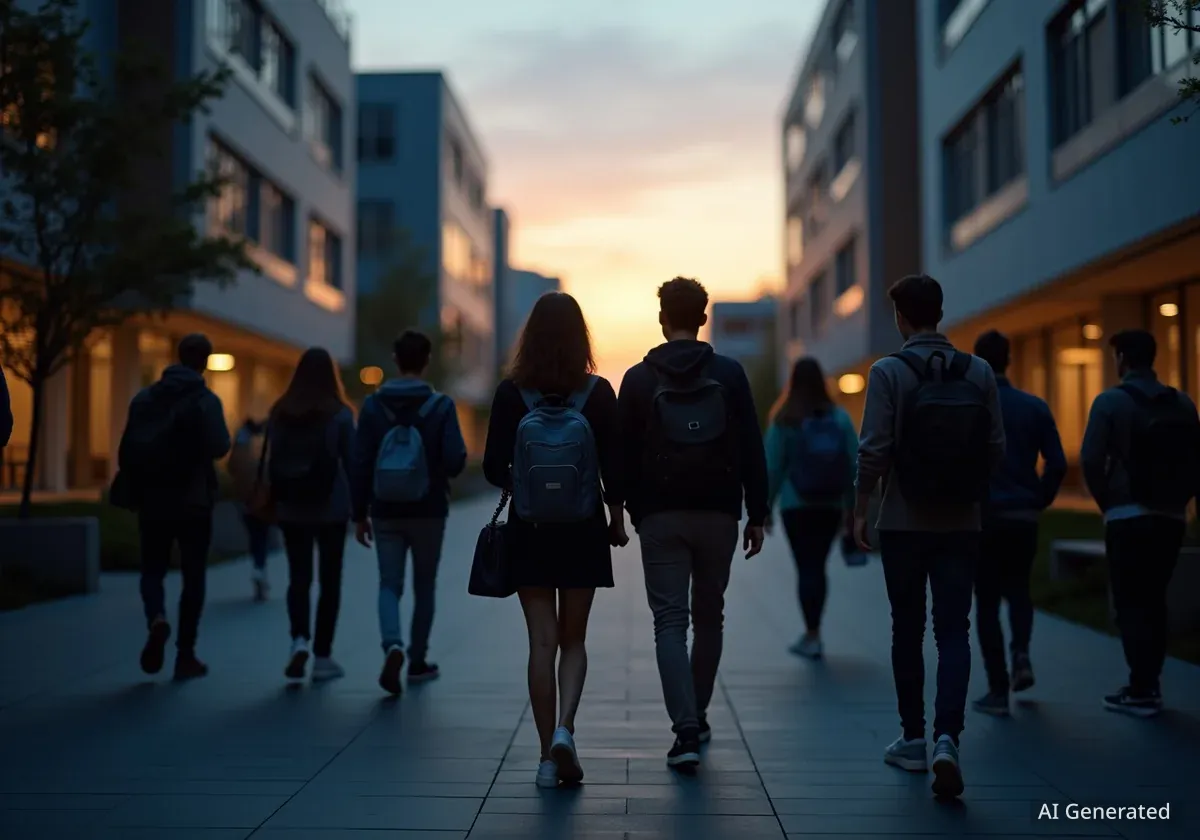The University of North Carolina Wilmington campus is navigating the aftermath of a two-hour shelter-in-place order on September 18, which was prompted by an unconfirmed report of a gunman. While officials later declared the incident a false alarm and confirmed no credible threat existed, students have expressed feelings of fear, frustration, and disappointment regarding the university's communication during the event.
Key Takeaways
- A false alarm about a gunman led to a two-hour lockdown at UNCW on Sept. 18.
- Students criticized the university's communication, citing delays in official alerts and a reliance on social media for information.
- In response, UNCW canceled classes on Sept. 19 and all on-campus events through Sept. 21.
- University officials, including the chancellor and Board of Trustees, have promised a full investigation and improvements to safety protocols.
Student Experiences During the Lockdown
For many students, the evening of September 18 was marked by confusion and fear. The university-wide siren and shelter-in-place alert sent a wave of anxiety across the campus community as students sought safety and information.
Firsthand Accounts of Uncertainty
Talan Barnak, a UNCW student, described the initial moments as unsettling. "I was about to head out of my dorm and my RA stopped me and wouldn’t let me out," Barnak recounted. He explained that resident advisors were aware of the situation before an official university-wide alert was issued, leaving him and others in the dark.
"I didn’t know what was going on because there wasn’t anything sent out yet," he added. Barnak, who lives on the first floor, noted the vulnerability he felt. "It was pretty scary because I’m on the first floor. So if they wanted to, I was thinking they could break down our window or something."
Another student, Bella Hatcher, was off-campus when the events began but lives close enough to hear the emergency sirens. She learned about the potential threat not from the university, but through a chain of friends. "I could hear the siren," Hatcher said. "And I didn't hear about (the gunman) from UNCW. I heard it from a friend who had heard it from a friend."
University Communication Under Scrutiny
A significant point of contention for students was the perceived delay and inadequacy of official university communications. Many felt they were left to piece together information from unofficial sources, primarily social media, which amplified their anxiety.
Communication Delay
According to student Bella Hatcher, the university's official email alert was not sent until approximately 10 minutes after the campus emergency sirens had already been activated.
Hatcher expressed deep frustration with how the situation was handled. She and her roommate attempted to drive to campus to help friends who might need a ride, but they were turned away by police who had secured the area.
"It's really frustrating. It seems like the campus doesn’t feel like it cares... It's really hard to go to a school that doesn't feel like they care about you at the moment."
– Bella Hatcher, UNCW Student
Barnak echoed these sentiments, stating, "I feel like they could have let us know earlier. We didn’t know what exactly was going on and then we just had to rely on social media." This reliance on unverified information during a critical incident is a key concern raised by the student body.
Official Response and Future Measures
In the hours and days following the false alarm, UNCW administration took several steps to address the situation and reassure the community. At 11:40 p.m. on September 18, the university announced the cancellation of all classes for the following day, citing "an abundance of caution."
This was followed by a further announcement on September 19 that all on-campus events would be canceled through September 21. The university reiterated that there was no credible threat to campus safety.
Leadership Pledges Action
In a video statement on September 19, Chancellor Aswani K. Volety acknowledged the community's concerns and committed to enhancing campus safety. "It is my duty to secure the integrity and safety of our university. I will not rest until we improve upon the already extraordinary effort demonstrated yesterday," Volety stated.
He also confirmed that the focus of law enforcement had shifted from emergency response to a full investigation. "Our law enforcement partners are shifting from a safety and intervention position to investigating what started this chain of events," he said.
Recent Campus Tensions
The lockdown incident occurred in the wake of heightened tensions on campus. These followed a September 15 vigil for conservative activist Charlie Kirk, which led to subsequent events including students painting over a memorial on the campus "spirit rock" and a separate police response to a threat in the early hours of September 18.
Statements from University and Student Leadership
Various governing bodies within the university have released statements addressing the incident and outlining their commitment to student safety and accountability.
Board of Trustees and Student Government
The UNCW Board of Trustees issued a statement on September 19, supporting the administration's response and reaffirming their confidence in Chancellor Volety's leadership. The board stated they are committed to ensuring that those responsible for the false alarm are "held fully accountable."
The board also addressed the communication issue indirectly, noting, "as a public institution, we are bound by protocols and policies that may restrict the immediate release of certain information."
Representing the student body, the UNCW Student Government Association (SGA) posted a statement to social media, vowing to champion student concerns. "There will be continued opportunities for students to ensure their voices are heard," the SGA statement read. "We will not back down from advocating until we feel it is safe for all students on our campus."
As the investigation continues, the UNCW community remains on edge, with students and administrators alike focused on rebuilding trust and strengthening the campus's emergency response systems.





